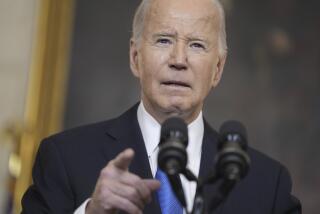As Senate debates farm bill, White House threatens a veto
- Share via
WASHINGTON — The Senate began debate Monday on a farm bill that would put more fresh fruit in school lunches and boost spending for conservation, but would also continue billions of dollars in subsidies while crop prices and farm incomes hit record levels.
The White House quickly made its unhappiness with the bill clear, announcing that the president probably would veto the measure. Administration officials said the bill, which would authorize spending $288 billion over five years, was too expensive.
The measure also has generated opposition from a broad coalition of taxpayer advocates, medical organizations, environmentalists and religious groups because it would continue expensive subsidies for crops such as corn, cotton, soybeans and rice.
Members of this unlikely alliance describe the bill as a failure in economic, environmental, foreign policy and health terms. They stress that the bill does not just affect rural areas and the nation’s 2 million farms, but also shapes the health of Americans and their land.
On the Senate floor Monday, lawmakers rose to defend the massive bill, sometimes with obvious ambivalence. Sen. Tom Harkin (D-Iowa), chairman of the Senate Agriculture Committee, acknowledged that crop subsidies were “very hard to justify when we’re having record prices and incomes.”
Harkin’s chief issue, though, was the White House veto threat. He said he had not received a formal statement from Bush but added that he was “concerned.”
“Let us hope the White House will work cooperatively with the House and the Senate to craft a farm bill the president will sign,” Harkin said. Lawmakers said they hoped to send a bill to the president by the end of the year.
Acting Agriculture Secretary Chuck Connor said the bill was full of budgetary gimmicks and made “a mockery of the budget process.”
The 2007 farm bill would add $80 million over five years for organic farming and marketing, as well as offer support for farmers’ markets and rural development. It would include money for malnutrition programs overseas and require the creation of a congressional commission on food safety.
It would spend more than $2 billion on fruit, nut and vegetable farming, which constitute the bulk of California agriculture and are not eligible for subsidies. That money would be spent on pest control, research, marketing and school lunches.
Though lawmakers have no more money to spend than they did in the 2002 farm bill, they have continued crop and farm subsidies, and added a $5-billion permanent disaster-aid fund that has drawn fire from advocates and the administration.
Skirmishes also are likely over attempts to limit subsidies and payments to farmers. Fewer than 10% of California farmers get federal subsidies. Sens. Charles E. Grassley (R-Iowa) and Byron L. Dorgan (D-N.D.) have an amendment that would limit payments to farmers who earn less than $250,000 a year and are actively involved in agriculture.
Sens. Richard G. Lugar (R-Ind.) and Frank R. Lautenberg (D-N.J.) will introduce the Fresh Act, which would replace cotton, wheat, corn, soybean and rice subsidies with a free insurance program for all farmers, including fruit, nut and vegetable cultivators.
On Monday, Sen. Saxby Chambliss (R-Ga.), a staunch defender of the subsidy system, warned his colleagues against altering it. “We uphold the strength of all America when we uphold the safety net,” he said. “If we go down the path of crippling farm programs in response to newspaper editorials, the inevitable result will be the outsourcing of our food and fiber.”
The medical, religious, environmental and taxpayer groups that have banded together to oppose the bill have the subsidy system firmly in their sights. Environmental groups say subsidies encourage the use of polluting pesticides. Physicians’ groups link the subsidized crops that produce a cheap supply of sugars and fats to maladies such as cancer, childhood obesity and diabetes.
Fiscal critics argue that taxpayers should not shoulder massive subsidy payments when farmers are doing so well. “With record crop prices and average farm income approaching triple digits, it’s clear that the time for reform is now,” said Steve Ellis of Taxpayers for Common Sense. “The changes that we’re advocating would keep millionaire farmers from receiving subsidies.”
This motley coalition faces the agricultural lobby, one of the most powerful in Washington, and a committee structure that is dominated by lawmakers from the Midwestern, Southern and Plains states that benefit most from the subsidy system.
The coalition was unable to stop passage of a House bill this summer that preserved the subsidy system, driven in large part by the desire of House Speaker Nancy Pelosi (D-San Francisco) to protect newly elected Democrats and, by extension, the Democratic majority. Pelosi said the bill represented major reform, in part because it limited annual payments to farmers who earn less than $1 million a year. Under the House bill, if a couple farms together, the limit would be $2 million.
Coalition members gathered Monday to state their support for the payment and subsidy amendments and issue a challenge to senators in both parties.
“This coming week will be a test of leadership first and foremost for the Democratic Party that now controls the Senate,” said Ken Cook, president of the Environmental Working Group. “They have to decide if they’re the party of big agriculture or not.”
Noting that Republicans say they don’t want government to interfere with businesses, Cook concluded: “We have here great opportunity for Republican leaders to say, enough is enough.”
--
More to Read
Get the L.A. Times Politics newsletter
Deeply reported insights into legislation, politics and policy from Sacramento, Washington and beyond. In your inbox three times per week.
You may occasionally receive promotional content from the Los Angeles Times.










